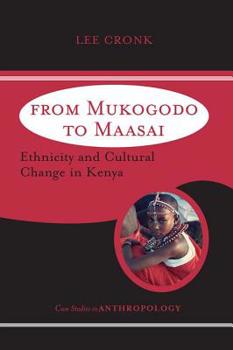From Mukogodo to Maasai: Ethnicity and Cultural Change In Kenya
Select Format
Select Condition 
Book Overview
This book focuses on the strategic manipulation of ethnic identity by the Mukogodo of Kenya. It is about how Mukogodo people changed their way of life to a radically different one, that is their change as Maasai people, giving them a new way of living, a new language, and a new set of beliefs.
Format:Paperback
Language:English
ISBN:0813340942
ISBN13:9780813340944
Release Date:August 2004
Publisher:Routledge
Length:192 Pages
Weight:0.65 lbs.
Dimensions:0.4" x 6.6" x 9.0"
Customer Reviews
1 rating
Very good scientific ethnography..but slightly flawed
Published by Thriftbooks.com User , 16 years ago
Lee Cronk excels in weaving together the history of the Mukogodo with sound (biological) evolutionary theory. This combination make for an exceedingly rich account of the salience of our evolutionary heritage without falling pray to simple, "just-so-stories". Through his understanding of Mukogodo history and particularly the complexities of the colonial influences, Cronk is able to elucidate not only current/recent behavior patterns, but the likely roots of these patterns. His examples allow us to understand the complex dynamic roles of cultural traits and how they sometimes work antagonistically and non-intuitively. I recommend it as an introductory text in undergraduate and graduate anthropology classes as well as for a compelling case study for scholars of anthropology, evolutionary biology, psychology, economics and other fields interested in human behavior. It is well written and easy to follow. It does a good job of explaining basic empirical field methods and the nature of fieldwork. Some caveats though. Cronk is muddled in his discussion of the adaptive nature of female-biased childhood sex ratio and genetics underlying behavioral traits. 1. Adaptive nature of female-biased sex ratio (pg 124). Cronk is correct that the female-biased sex ratio is not an individual feature, but one of the group. The more accurate question is whether the female-biased CARE is adaptive. The group selection argument is a red-herring (although group-selection should not be dismissed offhand in the way Cronk dismisses it - see work of David Sloan Wilson). Now, is female-biased CARE adaptive? Cronk has been building up to this case for most of the book, and then reaches the wrong conclusion. Just because a cost-benefit analysis (conscious or not) is put into giving less care to boys, and all else being equal parents would prefer to have their boys live as well, says virtually nothing about if the trait is an adaptation or not. Most all evolved traits represent trade-offs and maximizing fitness. Just because in this case little boys are suffering and dying does not mean this feature is not adaptive. Female-biased care is unlikely to be adaptive for the boy who is receiving less care (although it might be due to kin-selection). Cronk makes a strong case that it is adaptive for the parents..even if he dismisses his own case for dubious reasons. 2. Genetics of daughter favoritism (pg 125). Cronk is very likely correct that genetic differences do not underlie the daughter favoritism, but that instead this is a facultative trait. Given the rapid emergence of this trait and the interbreeding of Mukogodo with other groups that do not favor daughters, genetic differences are very unlikely to be important. However, his wholesale dismissal of a role for genes is folly. Genetically, Mukogodo are CERTAINLY different from you and me (despite Cronk's contention to the contrary). Yes, ~99.9% of genetic material is similar across all humans. However, with ~6 billion base pa






